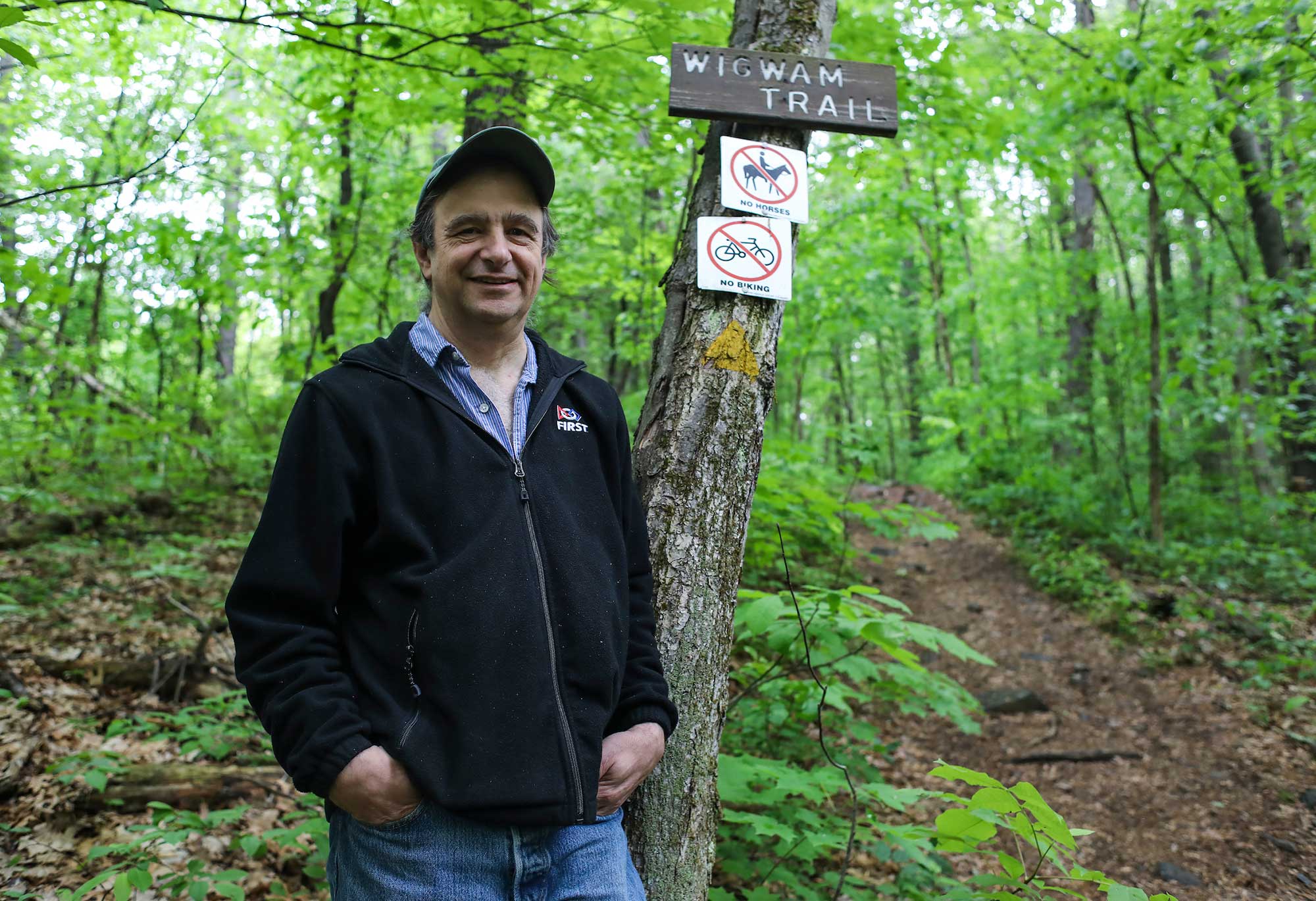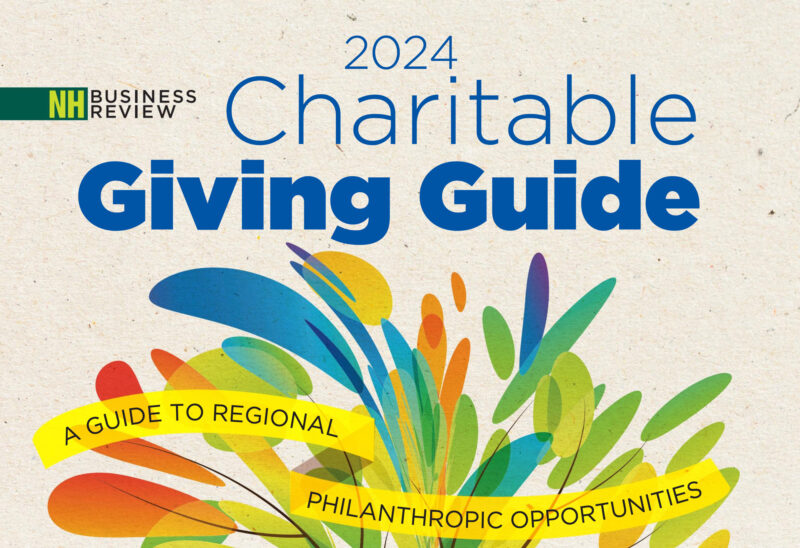Lyme disease changed Frank Grossman’s life. And he has never even had it.
When his business partner in a software company contracted the disease, Grossman watched the energy drain from his friend’s frame. He watched as his friend went from running marathons to stopping to catch his breath after climbing a flight of stairs.
Grossman took over the running of the shared business, which the pair eventually sold.
But he wanted to do something about the disease that had changed the trajectory of his friend’s life – and has changed so many others.
Grossman figured it this way: “I’ve got the energy since I don’t have Lyme, so I should put that energy to work.”
He decided he would use his donor-advised fund at the Foundation to do something about Lyme and other tick-borne diseases in New Hampshire.
Anne Phillips of the Foundation’s community impact department, who has a background in public health, worked with Grossman – researching the topic and work being done across the country, identifying and making introductions to state experts, and ultimately connecting him with the Community Health Institute, a public health nonprofit that focuses on technical assistance and training.
CHI brought together a panel of state experts – including representatives from the Department of Health and Human Services, the state’s epidemiologist, legislators and a University of New Hampshire entomologist – to help identify the gaps and what was most needed to help in the battle against Lyme disease in New Hampshire.
Grossman’s initial thought was to do an economic study that detailed the effects of the disease on the economy. “We are a lot less productive as a state because of Lyme,” he said. The Centers for Disease Control and Prevention, however, had a similar study already underway for the region.
What emerged from discussions with state experts was that was that the most pressing need was a consistent message and a good set of materials about prevention of Lyme and other tick-borne diseases – and a way to distribute them.
Tick Free New Hampshire was launched last year. This spring, 30,000 pieces of materials have already been distributed through the state’s Department of Education, Health and Human Services, Fish and Game and through New Hampshire preschools. Since children are particularly at risk, many of the materials focus on prevention for kids.
“New Hampshire has one of the highest rates of Lyme disease in the country,” said state epidemiologist Dr. Benjamin Chan. “But it’s not just Lyme disease…there are a number of other tick-borne diseases out there, and we are seeing new emerging tick-borne diseases and other types of bacterial infections. So that’s why it’s so important to focus upstream, on tick-bite prevention.”
Tick Free NH features a wealth of information, packaged in accessible, practical and kid-friendly materials: videos, workbooks and bracelets for kids, shower cards to remind kids to do tick-checks (popular with many summer camps.) The site also includes templates of policies for schools, camps and other organizations about tick-bite prevention and protocols. The site recently earned a national public health communications award.
The messaging works hard to spread the word about prevention without scaring people into staying indoors. “We have sometimes difficult winters and beautiful summers, and we want people to get outside and enjoy it without being afraid, but to do it in a more safe manner,” Chan said.
The state Department of Health and Human Services reports that nearly 1400 cases of Lyme were identified in New Hampshire in 2015, the most recent year for which data are available. Chan said that estimate is low, as not all cases are reported.
Tick Free NH hopes that the preventative efforts can help keep the incidence of Lyme and other tick-borne diseases to a minimum.
“There’s been a lot of controversy around Lyme disease and testing and treating and whether such a thing as chronic Lyme exists – and that is frustrating on many levels,” Chan said. “The great benefit of this group is that it has brought together providers and public health practitioners on both sides to focus on what I think we can all agree on, which is preventing tick bites in the first place…this group has been instrumental in helping to develop some of our state’s messaging and communication to prevent diseases through the prevention of tick bites.”
Tick Free NH is also targeting its messages and materials to people who spend their days working outside – like landscapers, electric line workers and tree service professionals. Grossman is working with outdoor clothing companies to partner on distributing the materials in retail locations.
“New Hampshire has a pretty limited budget,” Grossman said. “A lot of things depend on that private-public combination in order to be accomplished.”
Philanthropy has long played key roles in public health campaigns: The March of Dimes funded the development of the vaccine that eradicated polio. The Rockefeller Foundation launched a campaign that dramatically reduced hookworm infection in the southern United States. The Bill and Melinda Gates Foundation is working to eradicate malaria worldwide. In New Hampshire, the Charitable Foundation has been providing key leadership and funding in prevention of substance use disorders among young people.
Now, Tick Free NH is positioned to help people avoid the disease that has changed so many lives. “It was a wonderful collaboration,” Grossman said. “Philanthropy can accomplish a lot.”
For more information, to order materials or to help fund next year’s Lyme prevention efforts, email gvpxserrau@tznvy.pbz.












![Oluwakemi Olokunboyo of Dover received a McNabb scholarship to study nursing at Great Bay Community College [Photo by Cheryl Senter]](https://www.nhcf.org/wp-content/uploads/2024/05/Scholarship-Hero-800x548.jpg)
![Indrika Arnold, Senior Wealth Advisor, the Colony Group [Photo by Cheryl Senter]](https://www.nhcf.org/wp-content/uploads/2024/05/Indrika-Arnold-Hero-800x534.jpg)



![Charitable Foundation President Dick Ober [Photo by Cheryl Senter]](https://www.nhcf.org/wp-content/uploads/2023/12/dick-ober-purpose-fall-winter-2023-800x548.jpg)

